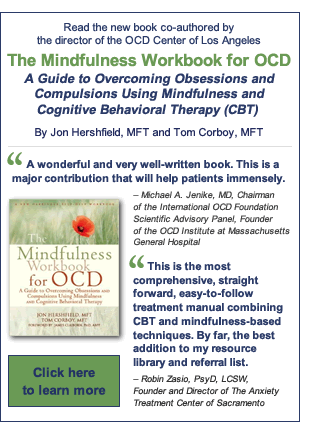Kimberley Quinlan, MFT, of the OCD Center of Los Angeles discusses the diagnostic overlap between OCD and eating disorders. Part one of a two-part series.

I was recently asked by a client if there was any functional difference between eating disorders and Obsessive Compulsive Disorder (OCD). After all, if OCD is defined as experiencing obsessive thoughts and compulsive behaviors, wouldn’t an eating disorder be categorized in the same way, given that those with eating disorders have obsessive thoughts about their weight and appearance, and respond to these thoughts with compulsive behaviors?
When looked at along these lines, it is obvious that OCD and eating disorders indeed have many similarities. But it is important to consider certain distinctions between these conditions before formulating a diagnosis.
To provide a better understanding of OCD and both its differences and similarities with eating disorders, clinicians rely upon specific diagnostic criteria. Recently, the American Psychiatric Association (APA) refined these criteria in the newly published Diagnostic and Statistical Manual (fifth edition), also known as the DSM-5. This manual is used by clinicians to differentiate between various psychological conditions, thus assisting in the development and implementation of appropriate treatment.
Obsessive Compulsive Disorder (OCD)
As noted above, OCD is defined by the experience of having obsessions and/or compulsions. The DSM-5 defines obsessions as “recurrent and persistent thoughts, urges, or images that are experienced as intrusive and unwanted”, and notes that such thoughts cause “marked anxiety or distress”. The DSM-5 further notes that individuals with OCD attempt “to ignore or suppress such thoughts, urges, or images or to neutralize them with some other thought or action (i.e., by performing a compulsion).”
The DSM-5 defines compulsions as “repetitive behaviors or mental acts that an individual feels driven to perform in response to an obsession or according to rules that must be applied rigidly”, and notes that these compulsions are “aimed at preventing or reducing anxiety or distress, or preventing some dreaded event or situation”. The DSM-5 further notes that compulsions “are not connected in a realistic way with what they are designed to neutralize or prevent, or are clearly excessive”.
OCD and Eating Disorders
Taken at face value, it seems obvious that the above diagnostic criteria could easily identify an eating disorder, as well as Obsessive Compulsive Disorder. Indeed, there are many similarities between OCD and various eating disorders.
Similar to OCD, individuals with eating disorders experience “recurrent and persistent thoughts” that cause marked anxiety or distress. In fact, the term Anorexia Nervosa comes from two Latin words that mean “nervous inability to eat.” Many who have experienced either Anorexia Nervosa or Bulimia Nervosa agree that, like OCD, there is significant anxiety associated with these conditions.
Common obsessions experienced by those with Anorexia and Bulimia are variants of such thoughts as “I’m fat” or “I need to lose 15 pounds”. And like individuals with OCD, those with eating disorders may also experience their obsessions as “urges” related to food, eating, and body image. Common urges experienced by those with eating disorders are “I must throw up” or “I must exercise”, or “I must restrict my caloric intake today to no more than x number of calories”. Those who suffer with eating disorders may spend many hours of the day obsessing over their weight, their meals, how many calories they have burned, and/or how their body looks or will look when they achieve their desired weight goal. One of the most debilitating obsessions experienced by those with eating disorders is that they will gain weight and become “out of control” with their eating.
The behaviors associated with eating disorders can quite easily be conceptualized as compulsions. Those with Anorexia are compulsive about limiting and reducing their food intake. Likewise, those with Bulimia will compulsively binge and purge in hopes of reducing and controlling their weight. And like OCD, the compulsive behaviors in eating disorders are performed in an effort to eliminate the discomfort experienced in relation to obsessions. Individuals with eating disorders often perform specific compulsions such as:
- Compulsively counting and calculating intake of calories, carbohydrates, fats, sugars, and proteins
- Compulsively exercising
- Compulsive use of laxatives and diuretics to reduce weight
- Compulsive vomiting to eliminate recently ingested food
- Compulsively asking for reassurance about their weight and appearance
- Compulsively checking appearance in mirrors
- Compulsively checking for fat by grabbing their flesh and/or evaluating folds of skin
- Compulsive avoidance of social events to reduce the likelihood of being subjected to foods deemed “off-limits” or to prevent the possibility of becoming “out of control” with food
OCD and Binge Eating Disorder
One of the many changes in the DSM-5 is the recognition and inclusion of Binge Eating Disorder as a legitimate condition. Prior to this recent revision, the very existence of Binge Eating Disorder was essentially ignored by the psychiatric establishment. While treatment providers specializing in eating disorders have for years recognized binge eating as a significant clinical issue, the APA was previously unwilling to consider it as a formal diagnosis.
As noted in my 2010 article, “Binge Eating Disorder / Compulsive Overeating and Its Treatment”, there has been a significant amount of controversy and confusion regarding the inclusion of Binge Eating Disorder in the DSM-5. Some have felt that the condition did not warrant recognition, and that by adding Binge Eating  Disorder to the DSM-5, the APA was essentially pathologizing common human behavior.
Disorder to the DSM-5, the APA was essentially pathologizing common human behavior.
While Binge Eating Disorder is formally classified as an eating disorder, those suffering with this condition often exhibit symptoms that have obsessive and compulsive qualities quite similar to OCD. The cycle of Binge-Eating Disorder often involves significant obsessions about the next meal, either strongly desiring or fearing it (fearing that one will over-eat again). Before, during, and after a meal, many with Binge Eating Disorder will repeatedly and compulsively review their concerns about body weight, body image and weight loss.
Those who experience the condition often report a compulsive “need” to eat large quantities of food at different times of the day. When they experience boredom, anger, guilt, anxiety, sadness or other unwanted emotions, they may eat in an effort to replace the distress of these feelings with short-term comfort. Many with Binge Eating Disorder describe entering into a trance-like state in which their compulsive eating behavior reduces their emotional and physical discomfort in the short-term, despite knowing that it will not relieve them of their long-term distress.
Many suffering OCD would explain their compulsive behavior in similar terms. Those with OCD perform compulsive behaviors that provide short-term anxiety reduction, knowing that their relief will not endure, and that in the long-term, their behaviors may actually worsen their discomfort. In this regard, the compulsive behaviors experienced by those with OCD and Binge Eating Disorder follow the same cyclical pattern, and serve the same purpose. You can read more about Binge Eating Disorder here.
OCD and Orthorexia
Perhaps no condition more clearly demonstrates the overlap between OCD and eating disorders than Orthorexia. Individuals with this condition obsess about eating a diet that is perfectly “healthy”, “pure”, and “correct”. Those with Orthorexia exhibit a compulsive eating style that is extremely rigid and inflexible, allowing only those foods that meet their exacting standards of purity.
Orthorexia is generally conceptualized as an eating disorder, as it involves severe restrictions and/or avoidance of certain foods. But, it is extremely important to recognize that, unlike Anorexia and Bulimia, Orthorexia it is not usually the result of distorted views of weight or body image. For those with Orthorexia, the focus of their obsession is not on weight, but on health.
Orthorexia may also be understood as a type of OCD, as it involves an extreme obsession about eating a perfectly pure and healthy diet. This obsession leads to compulsive eating behaviors that frequently and significantly affect social, psychological, and physical well-being, and can result in severe malnutrition.
Compulsions commonly seen in those with Orthorexia include:
- severe and rigid food restrictions
- excessive time spent reviewing and calculating nutritional content of food
- extensive food preparation (to ensure food is in its most natural state)
- social avoidance and withdrawal (for fear others will comment or disagree with restrictive/avoidant food choices
While not formally recognized as a psychiatric disorder in the DSM-5, Orthorexia is gradually gaining recognition in the medical and mental health professions. Many clinicians specializing in the treatment of eating disorders report an increasing number of clients exhibiting symptoms of this condition. And despite not including Orthorexia as a formal diagnosis, the DSM-5 provides clinicians the ability to make a diagnosis for this type of disordered eating with the diagnosis of Avoidant/Restrictive Food Intake Disorder. The criteria for this diagnosis include not just restrictive and/or avoidant food intake, but the negative psychological and psychosocial outcomes associated with such disordered eating behavior. While this diagnosis is quite broad, it allows clinicians to identify a more specific and helpful diagnosis for those with Orthorexia. You can learn more about Orthorexia here.
So, what is the difference?
Despite the similarities noted above, the DSM-5 has little to offer in terms of differentiating between OCD and eating disorders. The only direct comment in the DSM-5 in this regard is that “OCD can be distinguished from anorexia nervosa in that in OCD, the obsessions and compulsions are not limited to concerns about weight and food”. And herein is perhaps the simplest way of understanding the difference between these conditions. While the process of these conditions may be similar, the content of the obsessions and compulsions is different. In an eating disorder, the focus of the obsessions and compulsions is exclusively on issues related to food and eating.
It is worth noting that an individual can have OCD and an eating disorder, with the symptoms being unrelated. Likewise, one can have OCD symptoms that are focused on food and eating, without having an eating disorder. We have treated a number of clients who have had compulsive eating rituals that were not rooted in any of the eating disorders noted above. For example, some people with OCD feel compelled to eat specific foods in a certain order, or to count while eating, or to only eat at certain times. And some may avoid certain foods for reasons that have nothing to do with weight, health, or body image.
Our experience has been that clients with these types of compulsive eating rituals often have superstitious obsessions about the potential for “bad” things occurring if they eat in a manner that contradicts their obsessions. Their magical thinking may lead them to obsess that they will be responsible for those bad things happening if they do not assiduously follow their ritualized eating pattern. In these cases, OCD is the proper diagnosis.
If you are experiencing symptoms of both OCD and eating disorders, or if you are having difficulty differentiating between them, it is in your best interest to seek out an experienced therapist who has significant experience in treating both sets of conditions. Both can be very successfully treated using a combination of Cognitive Behavioral Therapy (CBT) and mindfulness. Using specific techniques, sufferers can learn to better manage the distress and anxiety related to their food-related symptoms, and to take a new approach to their intrusive and debilitating thoughts and behaviors.
Part two of this series will explore treatment strategies for effectively managing food-related obsessions and compulsions.
•Kimberley Quinlan, MFT, is a licensed psychotherapist at the the OCD Center of Los Angeles, a private, outpatient clinic specializing in Cognitive-Behavioral Therapy (CBT) for the treatment of Obsessive-Compulsive Disorder (OCD) and related conditions, including eating disorders. In addition to individual therapy, the center offers six weekly therapy groups, as well as online therapy, telephone therapy, and intensive outpatient treatment. To contact the OCD Center of Los Angeles, click here.




























































6 Comments
Excellent article which clearly discusses the similarities and differences between OCD and eating disorders. When my son’s OCD was severe he couldn’t eat, but he had no concerns about his weight. The issue was, as you describe, magical thinking and the belief that something bad would happen if he ate.From what I understand eating disorders can be so difficult to treat and I’m wondering how successful CBT is in dealing with them. Thanks again for this article. I will definitely be quoting you and linking to it on my blog.
In part 2 can you mention your thoughts on Chewing and Spitting? I am very close to someone who does this and I would like to see how it relates to OCD. This person has the habit of chewing candies and sweets, but spitting out the fluid/food instead of swallowing so as to avoid consuming the calories.
Janet,
Thank you so much for your response. CBT is very successful at treating OCD and Eating Disorders. In fact, we often treat clients who have both. As long as the therapist has expertise and experience with both of these specific disorders, CBT is a great treatment modality that can help work with the obsessions and compulsions involved.
Warmly,
Kimberley
Michael H,
Thank you for your response. “Chewing and Spitting” is a common behavior for those with eating disorders. It is also sometimes seen in people with OCD – for example if the sufferer feels the need for food to “feel right” before swallowing it.
It is important to note that these are two different disorders fueled by two completely different obsessions. Eating disorders are usually fueled by beliefs that one is fat or must lose weight. As a result of these obsessions, the sufferer may restrict caloric intake, purge, or “chew and spit”. In OCD, the client will have the obsession that things must be a certain way or “feel right” before swallowing, and will in turn chew food until they get the “right” feeling. Sometimes this can take hours.
Both of these obsessions can be treated with CBT. The most important part is to correctly identify the obsession in order to treat it specifically. Once the individual’s obsessions are challenged and restructured, we can then target the compulsion correctly.
I hope this answers your question.
Warmly,
Kimberley
I have suffered with eating disorders and self harming in the past. I have recently discovered I have obsessively thinking ocd/relationship ocd. The only way to control my panic is to harm myself or make myself sick. My husband is aware of this and helps me. When I have a panic if I can’t ritualise, due to my husband preventing me, I cry intensely until I fall asleep. Earlier on in the year I had a nervous breakdown due to this 🙁
Hello Me Somewhere,
It sounds like you are managing a lot of strong feelings and thoughts right now. When people have panic attacks, they often (always) try to find any way to escape these feelings. They can feel intolerable. But, it is important to understand that the best way to combat a panic attack is to do exactly the opposite. The goal is to allow these feelings to rise and fall on their own. In doing this, you will learn that they are, in fact, tolerable. Mindfulness training can be very helpful with these overwhelming thoughts and feelings.
You can read more about mindfulness in an earlier article I wrote entitled “Mindfulness for OCD and Anxiety”. You can also click here to learn more about mindfulness based therapy. I wish you all the best.
Warmly,
Kimberley